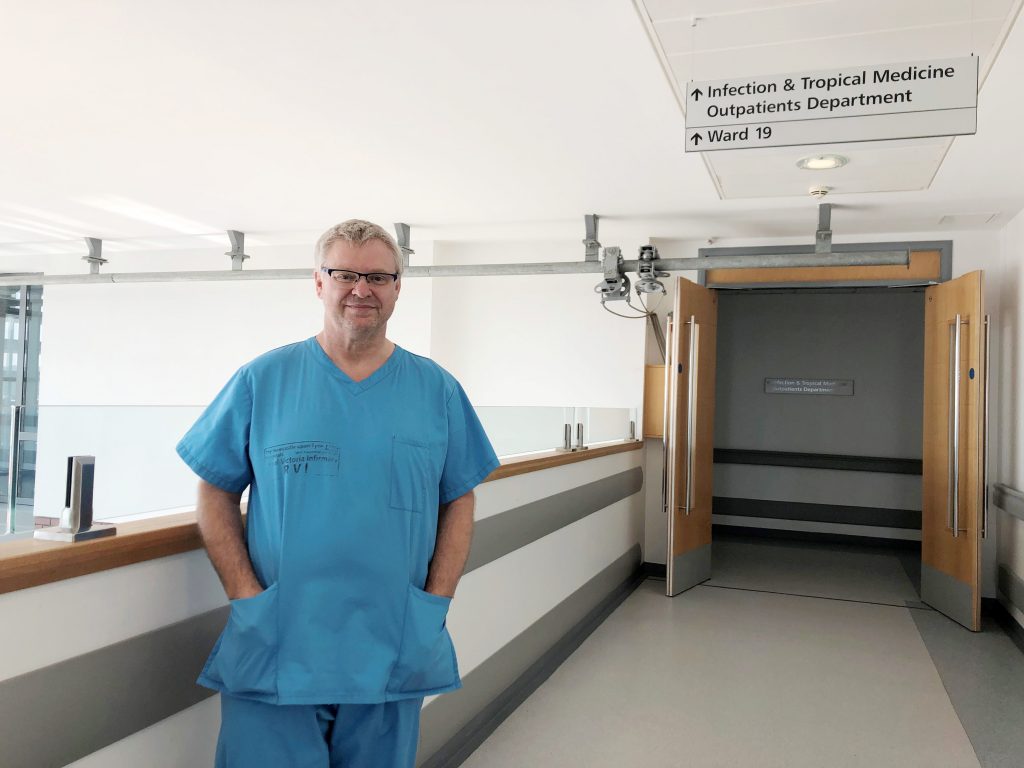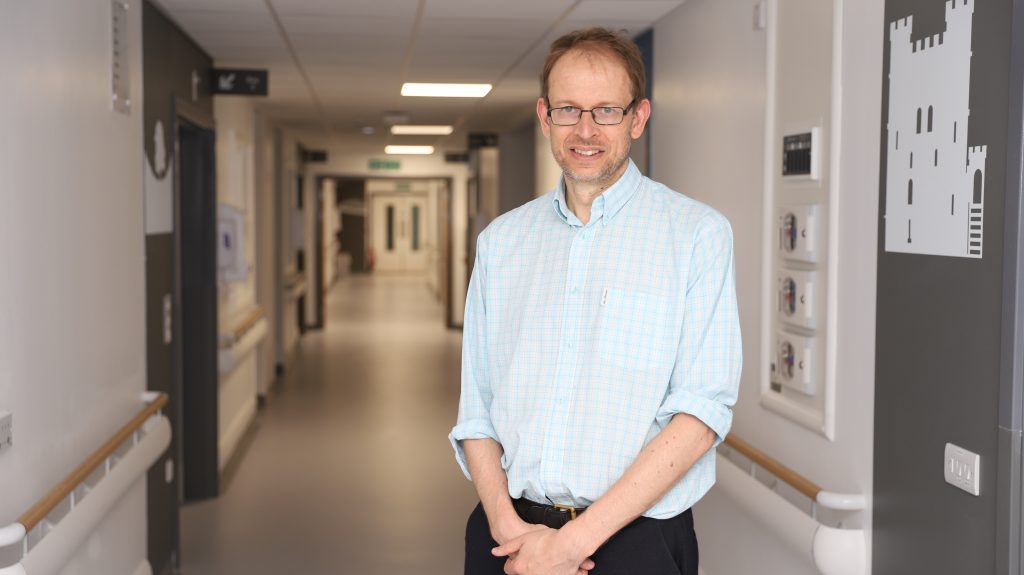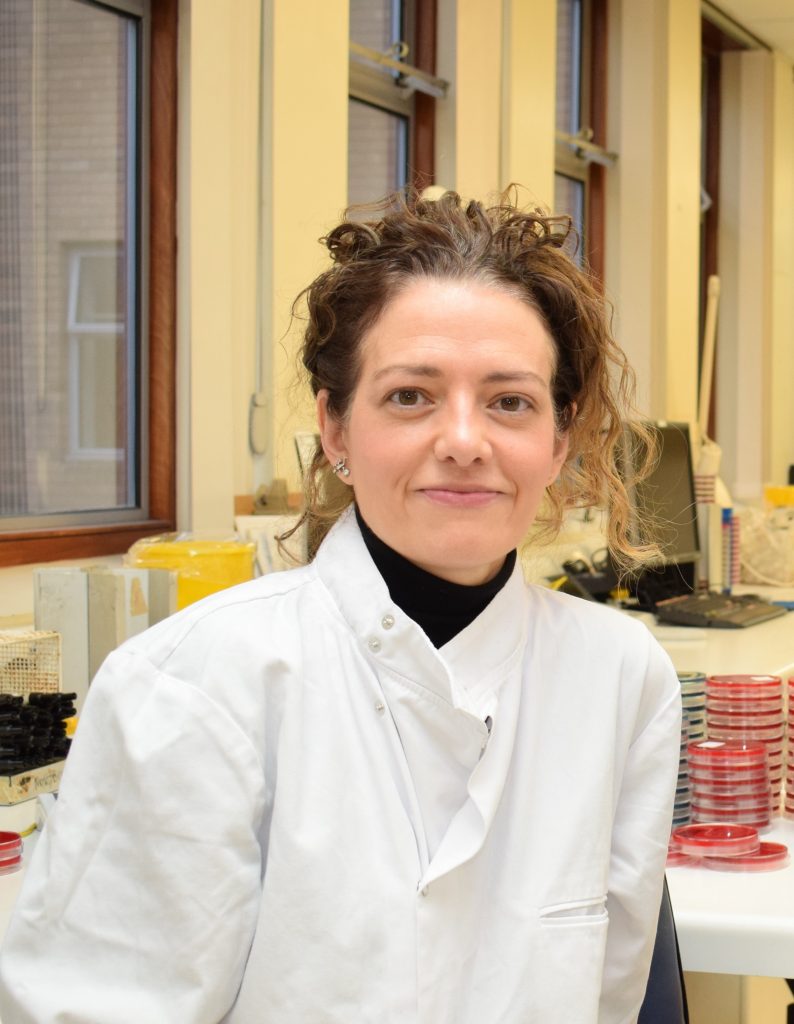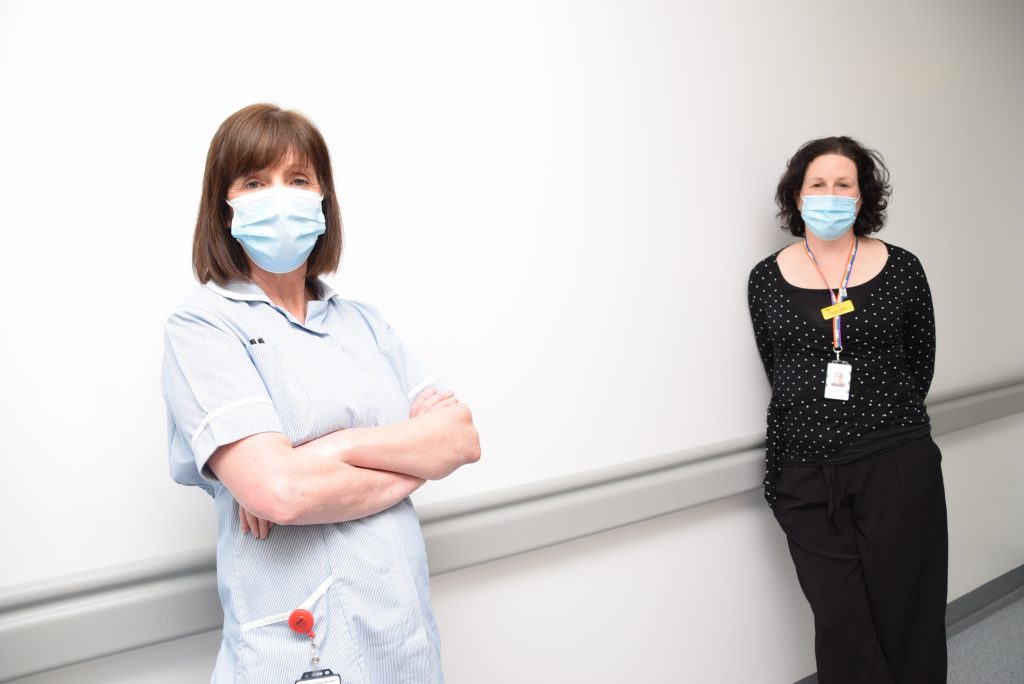NHS staff who were on Newcastle Hospitals’ frontline in the battle against COVID-19 are part of a special service of commemoration and thanksgiving today – the anniversary of the health service’s foundation.
Five clinicians have travelled to London to attend the service at St Paul’s Cathedral joining NHS Chief Executive Sir Simon Stevens, NHS Medical Director Professor Stephen Powis, and England’s Chief Nurse Ruth May among others.
They include some of the team who treated the UK’s first confirmed COVID-19 at the Royal Victoria Infirmary on 31 January 2020. Since then, the Trust has treated more than 2,000 patients, including 165 on its busiest day.
Today – on the 73rd birthday of the NHS – they have reflected on the pandemic and the impact it has had on them.

Matthias Schmid, the Head of the Department of Infection & Tropical Medicine: “It is a humbling and emotional experience to be invited to the NHS St Paul’s celebration service. I feel I am representing all my colleagues and staff within my department and across the Trust who have worked tirelessly over the last 18 months. We have looked after patients with dignity and have understood the difficulties they and relatives endured during the most difficult times during this pandemic.
I was the lead during the very beginning of this pandemic responsible for the first patients and responsible for ensuring all our staff were safe. Having a team that is caring and motivated is the best thing and we all supported each other. I tried to support staff who were initially anxious or concerned and who had worries about getting ill or transmitting infection to others. I was able to reassure staff who had made enormous sacrifices to feel safe and to be able to deliver the best care they could imagine.
I was involved from the beginning in creating local and national policies. Highlights over the last year included working with staff in the local End of life Covid Cell, the national HCID network, the national specialised commissioning services, the national Covid clinical policy groups, the NIHR and MHRA clinical trials expert advisory groups, the Long-Covid clinics, the clinical guidelines, but most of all my colleagues, managers and nursing team who I can rely upon day and night.
Attending St Paul’s service will be a reflection of some of the difficulties endured, remembering all the patients and staff who suffered over the last, celebrating some of the successes and recognising every single NHS health care worker as an essential and important person in the fight against this pandemic. I hope that this will not just remembered but that we will change the NHS to be here for the patients and its staff and to recognise that its staff are most important.”

Ashley Price, Consultant physician in infectious diseases, said: “It was back in December 2019 that I first heard there was a potential outbreak of a new virus in Wuhan, China. I remember being concerned about this turning into something bigger and when we learned that it was a coronavirus my concern grew.
“It was then early in 2020 that it became clear that we would have to prepare for a pandemic and that this could be something huge. Over the next few months we worked to prepare the hospital, working across the trust and outside organisations to set up the first screening facilities for coronavirus and working to prepare. We also set in motion the plan for increasing research capacity.
“The first patients that presented were in fact very well and were all discharged but it soon became painfully obvious that worse was to come as the virus swept through Northern Italy. Soon after we saw our first critically unwell patients. It was very emotional.
“Throughout the pandemic we have strived to put the care of our patients and their families at the forefront and I witnessed compassion in the great care that was given in very difficult circumstances.
“The whole trust pulled together to help and we helped to support each other through these difficult times.
We realised early on that research would be key to understand the best treatments to give. The whole research team in Newcastle pulled together to ensure that patients were able to be offered the opportunity to take part in crucial trials. These trials have ensured that we now have better diagnostics and ultimately treatment for COVID-19.
Vaccination was also potentially key and the support that we got to set up vaccine trials in the region was immense. We owe a huge debt of gratitude to all the healthy volunteers in the community and hospital who volunteered for these trials.
This research has offered hope in the form of the availability of tests for the virus, the treatments that we now have available for COVID-19 and the vaccines to protect us all from the virus.
The NHS has pulled together through hugely difficult times. I think it is safe to say I have never felt prouder to work within the NHS and grateful for all the support given by all the colleagues I have worked with during the pandemic.”
Lucia Pareja-Cebrian – Director of Infection Prevention Control and Consultant Microbiologist, one of the leaders in the Trust’s response to the pandemic.

”Over the last 18 months, many of us have lost someone and we have all lost something: every day has its own story. Unprecedented times” has been used too many times and we probably need a whole new vocabulary to describe life now.
Looking back at February last year, there was initial fear and uncertainty which quickly moved to that “getting on with it” which is what the NHS does best.
I think the pandemic has brought the best in all of us and that has kept us all going. I am in awe of what front line teams have done every day: it is the people that work in the NHS that make it what it is.
There have been some really difficult days and some good days too. The hardest thing for me has been to be away from my family in Spain. There are many people in the same position: those hugs will have to wait a bit longer for us. I am very grateful to a lot of people at work and at home my husband and my children have been absolutely amazing: I owe a lot to them.
It has been rewarding to work at Newcastle: knowing that you can make a difference, no matter what you do, does help when it is tough. The support from everyone across our Trust is something that will live with me forever. Looking ahead I think we all know that it is going to be difficult for a bit longer and we are not yet out of the woods. We will pull through the next challenge and we will, once more, make it look easy.”
Staff nurse Maria Wafer and consultant psychologist Dr Victoria Miller were both part of the team which set up one of the first specialist long COVID clinics in the UK to help manage people with long-term symptoms.

Consultant psychologist Dr Victoria Miller said: “The pandemic has restored my faith in human nature. To see so many of our amazing staff go above and beyond for patients, families and colleagues has been deeply emotional.
“Staff risking their own lives to sit with patients who are scared and frightened. Staff calling loved-ones to tell them their relatives have died. Staff not seeing their own families for months to protect them from infection. I feel humbled that I have been asked to go to St Paul’s when so many have done so much to help in the last year.
“It has been an amazing experience to work in the post-covid clinic. To see how quickly dedicated professionals developed this service. We have worked as a true MDT to give patients a fantastic experience of reassurance, test results and time to support their rehabilitation. I wish the whole team could be here at St Paul’s as it has been a true team effort.
Over the last year psychology in healthcare have been able to pull together and help out in so many ways. As well as working directly with patients, we have supported staff and teams with their own well-being.
“Our reflective practice sessions have been well received by staff who have found it helpful to have space to process all that they have been through. We were very happy that the respiratory and Infectious disease team included psychology in the post-covid clinic.
“It has been a real please to work so closely developing an innovative service and an amazing provision to some very distressed patients. I feel that this is a team effort and see my role as representing the team as I wish we could have all gone to celebrate together.”
